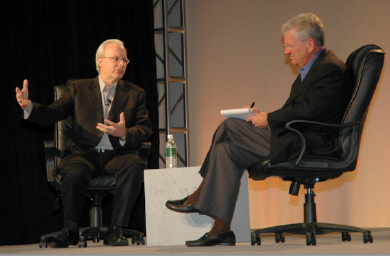Ozzie: Google a rallying point for Microsoft

"It all comes down to leadership," is what Ray Ozzie, one of three Microsoft CTOs, has to say about how Microsoft will compete with Google and others who want to topple Microsoft. Ozzie is leading the charge across Microsoft to bring a service orientation into the Microsoft's development culture and products.
He described the Microsoft's current junction in the context of five-year increments in recent computing history, moving from command line to graphics in 1990, Netscape and the early Web in 1995, programmatic use of the Internet in 2000 and in 2005, services. "The real question [for Microsoft], given the entire technology and competititve landscape is how to pivot what we working on into the new world--what are opportunities to bring value in new model," Ozzie said.
"It's a complex scenario. The reorganization just done is first step we have taken to push decision making more out to edge of organization. My role is more of an overlay structure, working across business groups to ensure we execute rapidly on scenarios," Ozzie added.
Getting everyone on the same page in such a complex company is a major challenge, Ozzie said. So is coming up with the scenarios. "A lot of the systems we built as an industry for customers have a model that doesn't relate to where things are going," Ozzie said. It's not a one-size-fits-all strategy. Microsoft will host some services, as it does with MSN, and work with partners in areas that require domain expertise or closer connection with customers.

Ray Ozzie and Geoffrey Moore
On the subject of Google [watch a video clip here], Ozzie called the company's success is a "very big deal," which has forced Microsoft to reflect on its business model. "It's a great wake up call and rallying point for people in the company," Ozzie said. "Google has built a very large data center infrastructure--we have the basis of that in MSN. As time goes on very few companies will have the scale to build massive infrastructure." Microsoft is looking how to leverage that kind of infrastructure for enterprises and developers.
When asked whether Microsoft and Google were headed for an head on collision, Ozzie said, "I don't know what Google will do....Google has the cash to fund internal initiatives, and they are trying lots of things. It's too soon to tell where they are headed." Ozzie differentiated between organizing the world's public information (Google's motto) and managing public and private information for enterprises. The enterprise has barely scratched the surface on services, but for it's clear that some systems can be brought into the cloud to drive management costs down, Ozzie said. Cloud-based email, such as HotMail and Gmail, won't work in an enterprise where compliance, policy-based management, access controls and other features are necessary, and require constant disk access.
"I don't really feel personally as though Microsoft is behind in any way, shape or form related to services except for the size of revenue from the new economic model," Ozzie said. The enterprise management transition from what's operated on in data center to what's out on Web will be a multi-year process, he added. "We are very early in how services can ultmately impact different markets," Ozzie said. Microsoft will have leadership as long as it focuses on enabling end-to-end scenarios for different customers across different segments and executing on those scenarios, he added. Part of that focus could mean getting more of the new revenue opportunity, such as offering advertising funded consumer and small business software.
Ozzie described the iPod as a powerful example of a service, weaving together hardware, software and services. MSN is Microsoft's lead asset in terms of understanding what it's like to build into cloud services, Ozzie said, and the expertise from that asset will be applied to Internet scale services and small business scenarios. More innovations will come from the edge and business units, rather than central IT departments, and solutions will have to span firewall boundaries to accomodate Microsoft's broad range of customers.
If it's a question of leadership, Microsoft has proven in the past that it can hold its own through major market transitions. It remains to be seen how well Gates, Ozzie, Ballmer and the other leaders at Microsoft pivot into the new services world, but you can bet that Google's leaders aren't counting them out...